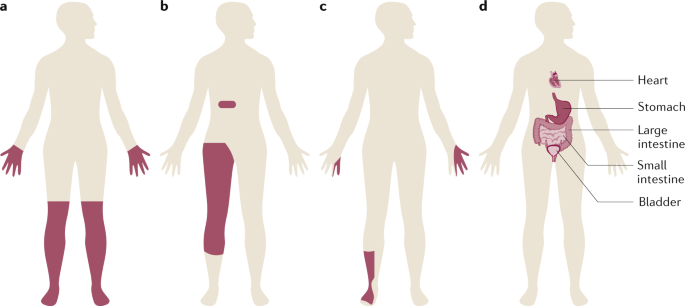Diabetic Polyneuropathy

Introduction
Diabetic polyneuropathy is a common and potentially debilitating complication of diabetes that affects multiple nerves throughout the body. This article sheds light on diabetic polyneuropathy, elucidating its causes, symptoms, diagnosis, treatment options, and the pivotal role of proactive management in diabetes care.
Understanding Diabetic Polyneuropathy
Diabetic polyneuropathy is a neurological disorder that results from prolonged exposure to high blood sugar levels. It occurs when nerve fibers, both sensory and motor, sustain damage, leading to a range of symptoms and complications. This condition is a form of diabetic neuropathy, with “poly” denoting the involvement of multiple nerves.
Causes and Risk Factors
The primary cause of diabetic polyneuropathy is uncontrolled or poorly managed diabetes, particularly when blood sugar levels remain elevated over time. Several factors increase the risk of developing this condition, including:
- Duration of Diabetes: The longer an individual has diabetes, the greater the risk of nerve damage.
- Blood Sugar Control: Consistently high blood sugar levels hasten the development and progression of polyneuropathy.
- Peripheral Vascular Disease: Reduced blood flow to nerves can exacerbate nerve damage.
- Nutritional Deficiencies: Lack of essential vitamins and nutrients can contribute to nerve dysfunction.
- Smoking: Tobacco use magnifies the risk of polyneuropathy in individuals with diabetes.
Symptoms
Diabetic polyneuropathy can manifest with a range of symptoms, which may include:
- Numbness and Tingling: Often starting in the toes or fingers and gradually spreading.
- Burning or Shooting Pain: Intense, spontaneous pain in affected areas.
- Muscle Weakness: Difficulty in performing everyday tasks due to muscle weakness.
- Loss of Coordination: Difficulty with balance and coordination.
- Sensitivity Changes: Heightened sensitivity to touch or, conversely, reduced sensitivity to pain, heat, or cold.
- Foot Ulcers: Increased risk of foot injuries, ulcers, and infections due to reduced sensation.
Diagnosis
Diagnosing diabetic polyneuropathy entails a comprehensive assessment, including:
- Medical History: Evaluating the patient’s history of diabetes, medication use, and lifestyle factors.
- Physical Examination: Assessing reflexes, muscle strength, and sensory perception.
- Nerve Conduction Studies: Measuring the speed of nerve signal transmission.
- Electromyography (EMG): Evaluating muscle and nerve function.
- Blood Tests: Checking for vitamin deficiencies or other underlying conditions that may contribute to neuropathy.
Treatment Options
The management of diabetic polyneuropathy aims to alleviate symptoms, slow disease progression, and improve overall quality of life. Treatment modalities may encompass:
- Blood Sugar Control: Achieving and maintaining target blood glucose levels is essential to prevent further nerve damage.
- Medications: Pain relievers, anticonvulsants, or antidepressants may be prescribed to manage neuropathic pain.
- Physical Therapy: Exercises and rehabilitation techniques to improve muscle strength and coordination.
- Lifestyle Modifications: Healthy eating, smoking cessation, and alcohol moderation are essential.
- Pain Management: Pain clinics may offer specialized treatments such as nerve blocks or spinal cord stimulation.
Importance of Proactive Management
Proactive management of diabetic polyneuropathy involves diligent blood sugar control, regular medical check-ups, and adherence to prescribed treatments. Early intervention can significantly improve symptom control and quality of life.
Conclusion
Diabetic polyneuropathy serves as a stark reminder of the critical importance of meticulous blood sugar control and ongoing diabetes management. By prioritizing nerve health and promptly addressing symptoms, individuals with diabetes can hope to mitigate the effects of polyneuropathy and enjoy a better quality of life.
